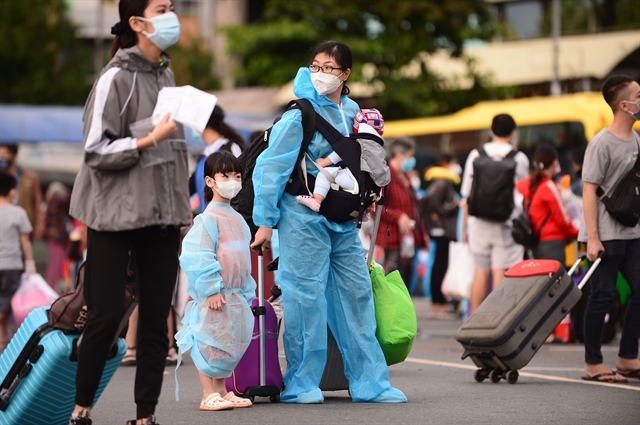 Society
Society

The Ministry of Health will begin vaccinating children aged between 12 and 17 years old against COVID-19 later this month, before expanding the vaccination to younger age groups, deputy health minister Trần Văn Thuận said on Saturday.

|
| A mother and two children in masks and protective gowns returning from severely COVID-19-hit HCM City to their hometown, the Central Highlands Province of Lâm Đồng on Saturday.— VNA/VNS Photo |
HÀ NỘI — The Ministry of Health will begin vaccinating children aged between 12 and 17 years old against COVID-19 later this month, before expanding the vaccination to younger age groups, deputy health minister Trần Văn Thuấn said on Saturday.
Thuấn unveiled the plans when replying to voters' opinions on the issue during an online voters meeting held by the delegation of National Assembly deputies from HCM City, with the participation of President Nguyễn Xuân Phúc.
According to Nguyễn Thanh Hùng, Director of Children’s Hospital No.1 in HCM City, about 20,000 children contracted COVID-19, and even though the danger posed by the virus to younger people is less significant compared to adults, the risks to children with underlying health issues or obesity are still high.
HCM City’s residents are naturally worried about their children’s safety when the southern city expects to resume in-person learning starting January 2022, while the COVID-19 strategy has switched to adaptation and mitigation rather than total elimination.
A large amount of the Pfizer COVID-19 vaccine doses would arrive in Việt Nam in the near future (out of its order for 51 million doses, slated to arrive mostly in this quarter, with 20 million reserved for children), the health official noted, adding that following a request made by President Nguyễn Xuân Phúc during his recent visit to Cuba, Việt Nam is now waiting for Cuba's data on child vaccines for consideration.
Pfizer's vaccines have been given by US Centre for Disease Control and Prevention for children aged 12-17, and the US company is seeking approval for use in children aged 5-11 (with lower dosages).
Cuba has developed two homegrown vaccines, Abdala for adults, and Soberana for children. Việt Nam has signed a deal to buy 5 million doses of the former, and a memorandum of understanding for the purchase of five million doses of Soberana once it has sufficient information from Cuba to give conditional approval.
Thuấn said there would be no shortage of vaccine resources between now and the end of the year, with a minimum of 120 million doses expected to arrive.
It is estimated that within 2021, Việt Nam will see more than 70 per cent of its adult population injected with one vaccine dose.
The nation has so far distributed 56 million doses of vaccines. As of October 8, some 51.4 million doses had been administered, with the number of adults getting one shot reaching 52.3 per cent of the population.
Risks control during reopening
At the meeting, President Phúc asked HCM City to come up with options and plans for monitoring post-reopening risks on a larger scale after months of strict lockdown as it remains the country’s COVID-19 epicentre, urging the city to improve its COVID-19 vaccination and treatment capacity.
He expressed his deep sympathy to local people on their great suffering and loss caused by the pandemic as well as the health workers regarding their hardships in caring for patients. He also appreciated the determination of the city's authorities and people to overcome difficulties and return to normal life.
On the basis of the city's economic recovery and reconstruction plan, Phúc agreed with the voters' proposals on risk control on a broader scale following the city’s reopening, vaccine coverage expansion, and measures to minimise the number of deaths.
The President also asked the city to coordinate with and support neighbouring localities.
HCM City should pay more attention to forecasting work, improving the local health sector’s response capacity, and staying proactive in responding to any arising situations, he noted.
At the meeting, participating voters, who are medical staff at hospitals and health centres, and lecturers of medical universities, presented 21 opinions.
In response, Chairman of the municipal People’s Committee Phan Văn Mãi said the city’s plan considered strengthening the health system as a key pillar. The city would study the idea of developing a hospital model for post-COVID-19 mental and psychological care, and promote the combination of military and civil medicine. — VNS




